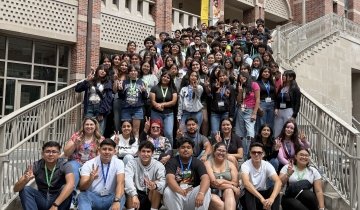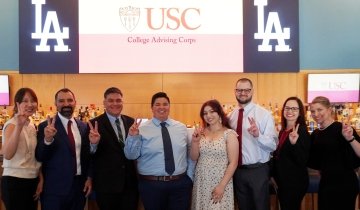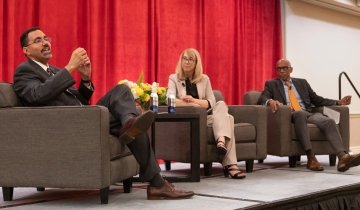In a time of increasingly divisive political rhetoric and troubling actions from those in positions of power, and perhaps now more than ever since the passage of the 1965 Elementary and Secondary Education Act, we need committed leaders to tackle challenges holding America back from living up to its self-concept as a land of opportunity for all.
Each of us deeply believes that educational equity is not only a key lever in this work, but that it also represents justice—particularly for students of color and low-income students.
We know, for instance, that educational opportunity in our country is not evenly distributed, and that these disparities translate into inequities in our society and lost potential for our youth.
For example, far too many schools that serve a majority of Black and Latino students do not offer a full spectrum of rigorous courses in core academic subjects, such as calculus or physics, which often are prerequisites for higher education. We also know that students of color who enroll in college are disproportionately affected by student debt, which in turn is the culmination of a history of choices by leaders and policymakers who maintained unjust policies on the basis of race and class—at times explicitly and at times through inaction.
And yet both of us are hopeful because of the very young people in classrooms and on campuses across America today. In fact, in many ways throughout our nation’s history, youth have been at the forefront of our march toward equity and justice, pushing adults to fight with urgency.
During the Civil Rights movement of the 1960s in Greensboro, N.C., college students launched lunch counter sit-ins that helped to spark the creation of the Student Nonviolent Coordinating Committee (SNCC). In 1968, students marched out of East L.A. high schools—just a few miles from USC’s campus—demanding that California’s education system provide the same opportunities to Latino students as it did to White students. And today, students are at the forefront of a national conversation to ensure that public schools are safe places to learn and that colleges are accessible halls of opportunity.
Nearly three years ago at The Education Trust–West’s Black Minds Matter rally, 1,000 high school and community college students marched from the California Department of Education to the steps of the state capitol building, calling for a renewed sense of equity and accountability for public schools and colleges.
This spring, Latino student leaders from the Puente program, featured in Education Trust–West’s The Majority Report, joined fellow advocates, community leaders and elected officials in Sacramento, making a call to action for improving Latino student opportunities and achievement in California.
As this young generation implores adults to do the right thing, we owe it to them to hold ourselves accountable. Our students deserve leadership that challenges any sense of complacency when it comes to eliminating educational inequities.
This year, California will elect a new cohort of state leaders, including the next governor, lieutenant governor and state superintendent of public instruction. Across the country, voters in 35 other states will go to the polls and hold elections for governor. More than 900 school board seats are up for election nationally.
The next movement in educational equity will require bold leadership from those we elect to lead our schools, our communities and our states. It will require conversations that are not always comfortable, but crucial. It will require us to be unabashed in our optimism, and unwavering in our commitment to justice, because our young people—who in so many ways are leaders themselves—deserve no less than our best efforts to help them thrive.




